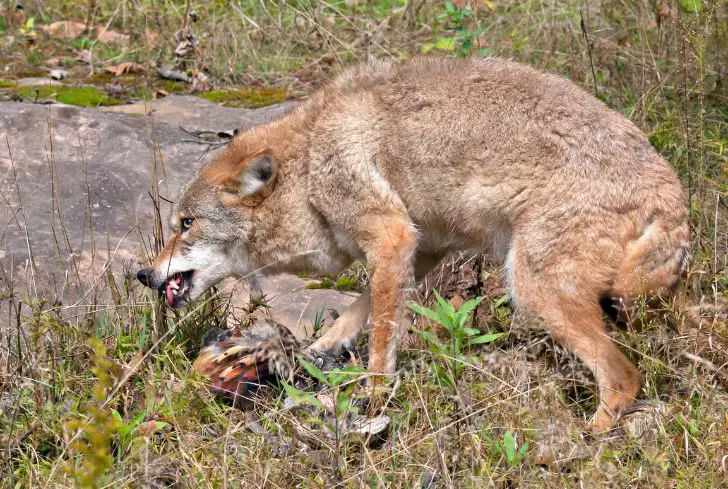An angry coyote is dangerous, but if they are in a pack, all hell can break loose. Coyotes like scavenging the forest, but it’s quite possible to find them around your neighborhood, possibly if they find food access to fill their stomachs. Although it’s easy to scare them away, will coyotes attack horses?
If you’re a farmer and have come across coyotes, you know how dangerous they can be to your livestock. But it all comes down to the defensive mechanism and tactics of the attacked animal. Therefore, below is a full insight into coyotes; read to learn their character.
Contents
Will Coyotes Really Attack Horses?
Yes, coyotes attack horses if they get the opportunity to do so. Because coyotes are predators, they’ll attack horses to kill for their meat. Weak and small horses are at great risk of coyote attack since they are vulnerable and unable to defend themselves.
Besides coyotes weighing around 40 pounds and horses almost 1200 pounds, coyotes will attack horses. Coyotes’ attacking trait is normal behavior for their survival. A lonely or small horse is a great opportunity. The bigger horses are much stronger and can deliver strong kicks; therefore, it can be challenging for the coyote to attack them.
Will a Coyote Attack a Mini Horse?
Yes, a coyote can attack a mini horse. The size of the horse matters a lot to the defensive mechanism. Being so, it has no strong back kicks to counterattack the coyote. However, if in the herd, they can work and defend themselves as a team unless the coyotes are many enough to challenge the mini horse.
Mini horses, commonly known as miniature horses, were developed for centuries through selective breeding with ponies and small horses. They were mainly found in Europe around the 1600s, and they were popular due to their size.
Their small size made them the best helpers in mines, and by around the 1800s, American miners found the need to have them. Since then, they have gained popularity in the U.S.
Mini horses are vulnerable and need protection against most predators, including coyotes.
How to Protect Coyotes From Mini Horses?
To protect your horse against coyotes, you should always keep them inside their den during the night and develop a predator deterrent strategy. Horse protection is essential, and where you keep them matters a lot.
The labor you’ll require when bringing the horses into protected paddocks every night is very considerable. Although being in paddocks can be challenging for the horses, especially during summer, it’s advisable to keep them indoors if there are predators around.
Because coyotes resemble dogs, it can be quite challenging for the horse to see it as a threat, especially when in paddocks. Although most horses have a well-developed sense of smell, it can be challenging to detect a coyote. Therefore, the correct deterrent strategy, like installing detective devices to detect predators, can be very useful.
Most predator deterrent requires the predators to get too close to the device to detect movement or sense the smell. Therefore, increasing the chances of attack before you even respond for help. You should therefore find insurance to cover the life of your horses.
Will Horses Keep Coyotes Away?
Yes, horses can keep coyotes away. Although coyotes are a great threat despite their small size, horses are not shy; they’ll just keep their distance but will not run away. If the coyotes try to cross boundaries to attack the young horses, their mothers can try to defend them.
However, it’s wise to mix your horse herd with other anti-predator animals like dogs and donkeys. Dogs, for example, are very protective and an enemy to most predators; their baking noise can help scare away coyotes.
And if the coyotes get too close, the dogs can take the fight and defend your horses against the attack. Fear is among the powerful forces affecting most creatures of different sizes and shapes, including coyotes.
Can a Horse Kill a Coyote?
Yes, a horse can kill a coyote depending on the power of the kicks it delivers and the part of the coyote that will get the injury. Like the human body, some parts are vulnerable and quit responding once they get injuries. They include the heart, lungs, and even liver. When a horse kick finds its way into these vital organs, the survival chances of the coyotes become minimal.
But on the other hand, a coyote can also kill a horse. Being predators, they have hunting techniques and body features that help them take down their prey within no time. Coyotes have sharp teeth and powerful jaws and are quick in attacking; this makes them a high chance of taking down their prey, including horses.
How Do You Stop Coyotes From Attacking?
Coyotes are shy animals and do not like noisy places or any destruction. So to stop coyotes from attacking, you can whistle, yell or shoot up. This way, you’ll scare them away. There are several means of scaring coyotes away to prevent them from attacking; you need to use that which is accessible.
To prevent frequent coyote attacks, search the neighborhood extensively and chase away any coyotes. Coyotes take refuge under caves or open channels, especially when they find potential food sources.
They mainly come out at night to hunt and kill; therefore, it is difficult to know their home. If you have dogs in your home place, they can be of great help. Their well-developed sense of smell can help you during the search.
What Other Animals Prey on Horses?
Most predators like lions, wolves, alligators, bears, and boars prey on horses. If you find one or more of these predators around your home, carefully watch your horses because they’ll most likely attack and kill or even leave them with severe injuries.
Wolves, for example, are among the world’s known dangerous animals. They are not only fast in attacking but also smart enough to attack prey unnoticed. And because they hunt in packs, lonely horses are the best target and easy to take down.
Are Horses Dangerous?
Naturally, horses are not aggressive to their owners but can be quite dangerous. A horse can bite; give powerful back kicks, which can leave you with massive injuries, especially when it is threatened. Horses love to be ridden on their back; it’s very rare to find them being aggressive.
Things that make horses aggressive include threatening to take their young ones, going from behind, and many others. At times it can be in their gene to be naturally aggressive, but it’s not quite happening.
Who Eats Horses?
Besides animals preying on horses, humans also kill horses for their meat. Most people in Japan, Canada, France, Switzerland, Belgium, Italy, and most European countries eat horse meat. Horse meat is dark and tender, most likely better than pork meat.
However, most cultures prohibit eating horse meat simply because they are helpers and culturally revered creatures. Most of all, horses’ bodies might be full of hazardous medicine that can negatively affect your body.
Is Horse Meat Legal in the United States?
It’s illegal to kill horses for their meat in most American states. It’s taboo in American culture to kill a horse for its meat. The law was implemented between 200-2011 during the reign of Barack Obama. Since then, farmers have been selling their horses to slaughterhouses in Canada and Mexico, where horse eating is popular.
You can also make horse meat to pellets forms for dog food. The meat is high in protein, which is good for both humans and animals. To eat horse meat, ensure you test it for any potential contamination from drugs or diseases. Make your safety the highest priority.
Is Horse Manure Good for the Farm?
Yes, horse manure is good for your farm. Maintaining nutritious and healthy soil for your garden enhances the good growth of your plants. This organic waste from the horses may smell unpleasant but is very good for producing great yields. Manure is best for garden use because it’s environmentally friendly. Unlike artificial fertilizers, manure does not pollute the garden or the water bodies when they find its way in.
However, horse manure is best in its composted form. Immediate manure that has yet to undergo full decomposition can burn your crops. The decomposing organism produces a lot of heat when in the decomposing process. Leave this manure for about two months to be at its best for garden use.
Final Verdict
Horses are very defensive when threatened, especially against their enemies, like coyotes. Coyotes are predators and can prey on any animal when they get the opportunity to take it down. Weak and lonely horses are at high risk of attack from coyotes, especially when hunting in packs.
On the other hand, mini horses and young horses also fall victim to coyote attacks because they are defenseless. To ensure safety, mix your livestock or horses with anti-predators like donkeys and donkeys. And if you have no anti-predator, consider installing alerting devices in the horse areas, especially in the paddocks.







